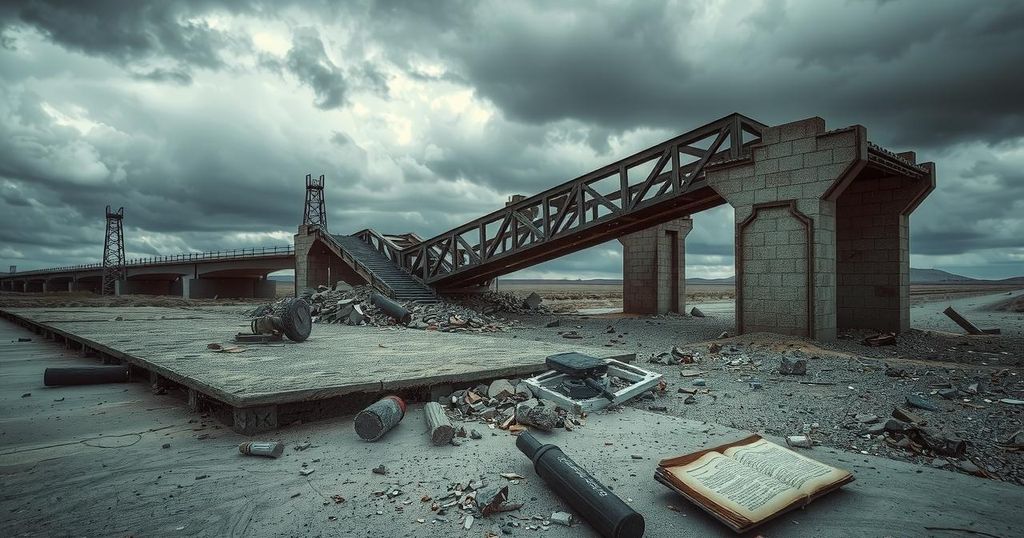The Democratic Republic of the Congo is experiencing significant unrest due to an offensive by the M23 rebel group, which is reportedly backed by Rwanda. The ongoing violence has led to casualties among UN peacekeepers and the displacement of thousands of civilians while overwhelming local health services. Congolese Foreign Minister Thérèse Kayikwamba Wagner emphasized international accountability and the urgency of addressing the humanitarian crisis to prevent further regional instability.
The Democratic Republic of the Congo is currently facing severe instability due to the aggressive actions of a Rwanda-backed rebel group known as M23. This recent offensive has led to intense violence, including the deaths of United Nations peacekeepers, the widespread displacement of civilians, and the overwhelming of healthcare facilities, raising concerns about a potential broader regional conflict. Congolese Foreign Minister Thérèse Kayikwamba Wagner expressed these dire circumstances in a recent discussion regarding the situation in Goma.
The M23 group has taken control of the strategic city of Goma, which is located near the Rwandan border, escalating long-standing tensions between the two countries. Minister Kayikwamba Wagner highlighted the humanitarian crisis in the region, characterized by the occupation of Congolese territory by Rwandan Defense Forces, which has resulted in the destruction of essential infrastructure, leaving civilians vulnerable and deprived of medical care.
In the interview, the Minister emphasized the alarming situation, noting that health facilities are being targeted amidst conflict and stating that seventeen UN peacekeepers have been killed in recent clashes. This ongoing humanitarian disaster not only threatens the stability of the DR Congo but also poses significant risks to regional peace and security.
When questioned about Rwanda’s denial of its involvement with M23, Minister Kayikwamba Wagner referred to evidence including United Nations reports that identify the presence of Rwandan troops in the area. She asserted that these claims are supported by the observations of international media and senior officials from the UN Security Council, underscoring the collective acknowledgment of Rwanda’s role in the conflict.
The Minister elaborated on the strategic importance of the eastern region of the DRC, noting the exploitation of coltan resources facilitated by forced labor. Rwanda’s military presence in the region is intertwined with illegal mineral extraction, which is being funneled into global markets under false pretenses, exacerbating human rights violations and worsening the humanitarian crisis.
Reflecting on the international community’s response, Minister Kayikwamba Wagner advised that earlier action could have mitigated the escalation seen today. She praised efforts by the United States for recognizing Rwanda’s involvement and called for the UN to demand a withdrawal of Rwandan troops from the DRC and enforce an embargo on minerals sourced illegally from Congolese territory.
Moreover, she pointed out that continued inaction would allow Rwanda’s aggression to unfold unchecked, potentially destabilizing the region further and endangering ongoing international investments aimed at promoting peace. As the M23 group asserts the goal of overthrowing the Congolese government, this could trigger a massive regional crisis, reversing decades of progress toward stability.
The Democratic Republic of the Congo (DRC) has a turbulent history marked by conflicts involving various rebel groups, with the M23 being one notable faction linked to Rwandan military support. These tensions originate from geopolitical dynamics and economic interests in the resource-rich eastern DRC, where issues of sovereignty, human rights, and regional stability often collide. The involvement of international bodies such as the United Nations underscores the global implications of local conflicts, particularly when they threaten peace in the central African region.
In conclusion, the situation in the Democratic Republic of the Congo remains critical, with escalating conflict initiated by the M23 rebel group and exacerbated by perceived foreign intervention. The humanitarian crisis is deepening, necessitating urgent international intervention to prevent further fallout. The Congolese government’s calls for action against Rwanda’s military presence highlight the need for a cohesive global response to restore peace and stability in the region.
Original Source: www.pbs.org






